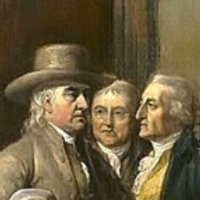U.S. Constitution of 1787 is Foundational Law, in America ... Good Vs. Evil
"Good" is defined as "Absent Injury"; "Evil" is defined as "Cause of Injury."
The United States of America Constitution of 1787 is the Supreme Law of the Land, in America, which provides law for restitution to individuals whom are injured by the evil deeds of another entity.
America's Constitution of 1787 governs all law, and property rights, in the United States of America against theft, assault, detainment, and all other evil deeds.
Understand the Law ...
Learn Your Unalienable Rights and How to Defend them Against the Mob.
"The People" in America have the unalienable right to "Life, Liberty and the Pursuit of Happiness" protected by law in which judges are bound by oath to protect. "The People" are governed by constitutional law.
Writ of Habeas Corpus
Individual Liberty is Granted by the Grace of our Creator.
In America, “Habeas Corpus” is guaranteed by law except in times of rebellion… riots.
Understanding habeas corpus can best be achieved by comprehending the U.S. Constitution as the Supreme Law of the Land, in America.
Understand Unalienable Rights … The “Bill of Rights”
Guaranteed to you by Law by "Elected Officials" and Judges sworn by oath to obey the United States Constitution of 1787
Amendment I
- Freedom of Religion, Speech, Press, Assembly, and Petition -
"Congress shall make no law respecting the establishment of religion, or prohibiting the free exercise thereof; or abridging the freedom of speech, or of the press; or the right of "the people" peaceably to assemble, and to petition the Government for a redress of grievances."
Amendment II
- Right To Bear Arms. -
"A well regulated Militia, being necessary to the security of a free State, the right of "the people" to keep and bear Arms, shall not be infringed."
Amendment III
- Quartering of Soldiers -
"No Soldier shall, in time of peace be quartered in any house, without the consent of the Owner, nor in time of war, but in a manner to be prescribed by law."
Amendment IV
- Search and Seizure -
“The right of “the people” to be secure in their persons, houses, papers, and effects, against unreasonable searches and seizures, shall not be violated, and no Warrants shall issue, but upon probable cause, supported by Oath or affirmation, and particularly describing the place to be searched, and the persons or things to be seized.”
Amendment V
- Grand Jury, Double Jeopardy, Self Incrimination, Due Process, Takings -
"No person shall be held to answer for a capital, or otherwise infamous crime, unless on a presentment or indictment of a Grand Jury, except in cases arising in the land or naval forces, or in the Militia, when in actual service in time of War or public danger; nor shall any person be subject for the same offence to be twice put in jeopardy of life or limb; nor shall be compelled in any criminal case to be a witness against himself, nor be deprived of life, liberty, or property, without due process of law; nor shall private property be taken for public use, without just compensation."
Amendment VI
- Right to Speedy Trial by Jury, Witnesses, Counsel -
"In all criminal prosecutions, the accused shall enjoy the right to a speedy and public trial, by an impartial jury of the State and district wherein the crime shall have been committed; which district shall have been previously ascertained by law, and to be informed of the nature and cause of the accusation; to be confronted with the witnesses against him; to have compulsory process for obtaining witnesses in his favor, and to have the assistance of counsel for his defense."
Amendment VII
- Jury Trial in Civil Lawsuits -
"In Suits at common law, where the value in controversy shall exceed twenty dollars, the right of trial by jury shall be preserved, and no fact tried by jury, shall be otherwise re-examined in any Court of the United States, than according to the rules of common law."
Amendment VIII
- Excessive Fines, Cruel and Unusual Punishment -
"Excessive bail shall not be required, nor excessive fines imposed, nor cruel and unusual punishments inflicted."
Amendment IX
- Non-Enumerated Rights Retained by People -
"The enumeration in the Constitution of certain rights shall not be construed to deny or disparage others retained by "the people."
Amendment X
- Rights Reserved to States or People -
"The powers not delegated to the United States by the Constitution, nor prohibited by it to the States, are reserved to the States respectively, or to "the people".
If anyone violates your rights, then either they are obeying the law, the constitution to which they swear to obey, or they are personally responsible for their actions … that’s the law.
Anyone who claims power they do not have by law are not obeying the law.
Brother Jonathan
posted in USConstitution.legal
01/18/2024

